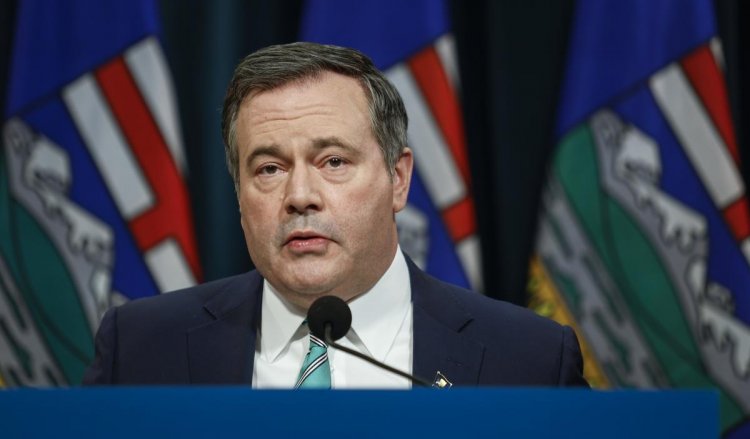Russia’s war on Ukraine renewed talk about Canada’s ‘ethical oil.’ Here’s what experts say about that push
Since the Russian invasion of Ukraine began, Conservative politicians in Canada have renewed the rhetoric of “ethical oil” to encourage investment in Alberta’s energy sector.It’s an argument that frames the sector as a cleaner, safer and ethically superior alternative to oil produced by non-democratic regimes.Alberta Premier Jason Kenney travelled this month to Houston, where he encouraged energy leaders to invest in Canada rather than Russia, Saudi Arabia or Venezuela — regimes that Kenney says use oil profits to “fund terrorism, violence and global instability.” He has tweeted that “nobody wants Putin’s blood-soaked oil and gas.” Conservative leadership candidate Pierre Poilievre has echoed Kenney’s argument, suggesting last week that “Quebecers want Canadian energy, not foreign oil from the dirty dictatorships.” The Star spoke to several experts about the “ethical oil” argument, and whether it holds weight in the current political and economic context. They identified several problems.Ethical oil?The argument that companies have a moral imperative to invest in Canadian oil versus oil from non-democratic regimes is not new.Ezra Levant — the right-wing political activist who founded Rebel News — published the bestselling book in 2010 “Ethical Oil: The Case for Canada’s Oil Sands.” The book posits that the Alberta oilsands face a disproportionate amount of criticism when compared to oil production in non-democratic regimes. Levant argued that investors should consider four criteria for assessing a country’s suitability for energy development: environment, conflict, economic and social justice, and freedom from oppression.As prime minister, Stephen Harper embraced the rhetoric of ethical oil, stating that petroleum from Alberta is superior to crude from other countries.The Star spoke to Tim McMillan, the president and CEO of the Canadian Association of Petroleum Producers (CAPP) — a lobby group that represents the Canadian oil and natural gas industry — who suggested that investors’ unwillingness to invest in Canadian oil has created a reliance on energy from non-democratic regimes. McMillan said seeing companies forced to walk away from their investments in Russia following the invasion of Ukraine advances the argument for investing in Alberta oil.“This is a time where global investors, I think, are reassessing whether they want to continue down that path or look to countries like Canada that can be a reliable, high quality, socially responsible supplier of energy,” he says. “So now is the time to be putting our best foot forward.“And I think reassessing, do we have the right policy environment in Canada to be attracting these investments away from dictators? And if not, what can we do to streamline our regulatory process to position ourselves for success and position our allies and the globe for success?”However, according to economists, public policy experts and environmentalists, the ethical oil argument runs into serious problems given Canada’s current economic outlook.The capacity issueThe main issue with the ethical oil argument is that it assumes sustained and long-term demand for oil — an assumption that is quickly eroding, according to Sara Hastings-Simon, a professor of physics and public policy at the University of Calgary who researches macro energy systems.Unlike conventional oil or U.S. shale, Alberta energy primarily comes from oilsands projects, which depend on an intensive process that requires long-term investments in construction and infrastructure. This makes it extremely difficult for Alberta to significantly ramp up production in the short or even medium term.“If you want to develop a new greenfield project in Alberta, that’s a multi-year, or even decades-long investment scale,” Hastings-Simon explains. “There are some things that you can do with existing projects to produce incrementally more — we’re talking a few per cent on the short term — but any attempt to add meaningful capacity is again, a longer project.”This week, the federal government announced a plan to boost crude oil production by around five per cent this year to help ease tight oil markets.However, experts don’t expect surging oil prices to spark the kind of rapid oilsands development seen in previous decades. As Canada and the global economy transition away from fossil fuels, Hastings-Simon said, the demand for oil will flatten and eventually decline, making investors hesitant to invest in long-term projects.“In 2021, during a period of economic recovery with demand for oil coming back, higher prices weren’t leading to the same kind of reinvestment and big project development that they had before,” Hastings-Simon said. “I think that that is the signal that we are really entering a different era when it comes to the development of this resource in Alberta.”Looking forward, Hastings-Simon believes that demand for Canadian oil will be significantly affected by the accelerating pace of electric vehicle adoption. According


Since the Russian invasion of Ukraine began, Conservative politicians in Canada have renewed the rhetoric of “ethical oil” to encourage investment in Alberta’s energy sector.
It’s an argument that frames the sector as a cleaner, safer and ethically superior alternative to oil produced by non-democratic regimes.
Alberta Premier Jason Kenney travelled this month to Houston, where he encouraged energy leaders to invest in Canada rather than Russia, Saudi Arabia or Venezuela — regimes that Kenney says use oil profits to “fund terrorism, violence and global instability.” He has tweeted that “nobody wants Putin’s blood-soaked oil and gas.”
Conservative leadership candidate Pierre Poilievre has echoed Kenney’s argument, suggesting last week that “Quebecers want Canadian energy, not foreign oil from the dirty dictatorships.”
The Star spoke to several experts about the “ethical oil” argument, and whether it holds weight in the current political and economic context. They identified several problems.
Ethical oil?
The argument that companies have a moral imperative to invest in Canadian oil versus oil from non-democratic regimes is not new.
Ezra Levant — the right-wing political activist who founded Rebel News — published the bestselling book in 2010 “Ethical Oil: The Case for Canada’s Oil Sands.” The book posits that the Alberta oilsands face a disproportionate amount of criticism when compared to oil production in non-democratic regimes. Levant argued that investors should consider four criteria for assessing a country’s suitability for energy development: environment, conflict, economic and social justice, and freedom from oppression.
As prime minister, Stephen Harper embraced the rhetoric of ethical oil, stating that petroleum from Alberta is superior to crude from other countries.
The Star spoke to Tim McMillan, the president and CEO of the Canadian Association of Petroleum Producers (CAPP) — a lobby group that represents the Canadian oil and natural gas industry — who suggested that investors’ unwillingness to invest in Canadian oil has created a reliance on energy from non-democratic regimes. McMillan said seeing companies forced to walk away from their investments in Russia following the invasion of Ukraine advances the argument for investing in Alberta oil.
“This is a time where global investors, I think, are reassessing whether they want to continue down that path or look to countries like Canada that can be a reliable, high quality, socially responsible supplier of energy,” he says. “So now is the time to be putting our best foot forward.
“And I think reassessing, do we have the right policy environment in Canada to be attracting these investments away from dictators? And if not, what can we do to streamline our regulatory process to position ourselves for success and position our allies and the globe for success?”
However, according to economists, public policy experts and environmentalists, the ethical oil argument runs into serious problems given Canada’s current economic outlook.
The capacity issue
The main issue with the ethical oil argument is that it assumes sustained and long-term demand for oil — an assumption that is quickly eroding, according to Sara Hastings-Simon, a professor of physics and public policy at the University of Calgary who researches macro energy systems.
Unlike conventional oil or U.S. shale, Alberta energy primarily comes from oilsands projects, which depend on an intensive process that requires long-term investments in construction and infrastructure. This makes it extremely difficult for Alberta to significantly ramp up production in the short or even medium term.
“If you want to develop a new greenfield project in Alberta, that’s a multi-year, or even decades-long investment scale,” Hastings-Simon explains. “There are some things that you can do with existing projects to produce incrementally more — we’re talking a few per cent on the short term — but any attempt to add meaningful capacity is again, a longer project.”
This week, the federal government announced a plan to boost crude oil production by around five per cent this year to help ease tight oil markets.
However, experts don’t expect surging oil prices to spark the kind of rapid oilsands development seen in previous decades. As Canada and the global economy transition away from fossil fuels, Hastings-Simon said, the demand for oil will flatten and eventually decline, making investors hesitant to invest in long-term projects.
“In 2021, during a period of economic recovery with demand for oil coming back, higher prices weren’t leading to the same kind of reinvestment and big project development that they had before,” Hastings-Simon said. “I think that that is the signal that we are really entering a different era when it comes to the development of this resource in Alberta.”
Looking forward, Hastings-Simon believes that demand for Canadian oil will be significantly affected by the accelerating pace of electric vehicle adoption. According to a recent report by the International Energy Agency, the global market share of electric vehicles nearly doubled from 2020 to 2021 to nine per cent. Bloomberg projects that the market share will hit 14 per cent in 2022.
In the U.S. — one of the largest importers of Canadian oil — 44 per cent of oil consumption is in the form of motor gasoline. This means that rapid growth in electric vehicles has the potential to meaningfully reduce U.S. demand for oil.
“I can’t underscore enough how quickly electrification is happening and how much it is looming over the future of that sector,” she says.
Martin Z. Olszynski, an associate professor of law at the University of Calgary, points to cancelled or delayed oilsands projects as evidence that global investors are increasingly considering Alberta a risky bet for future development. For example, in 2020, Teck Resources Ltd. cancelled plans to build a multibillion-dollar oilsands mine in northern Alberta, citing uncertainty about Canada’s climate policy.
“The provincial regime is very lax, and yet there are dozens of projects currently sitting on the books with the Alberta Energy Regulator that have been approved that don’t seem to be moving anywhere.”
Canada does not have the capacity to displace foreign oil
“If Ottawa & Washington get serious about pipelines, Alberta can play a major role in displacing dictator energy from global markets,” Kenney tweeted this month.
But experts say that Canada and the U.S. do not have the economic sway to significantly divert demand away from non-democratic regimes such as Russia.
G. Kent Fellows, a professor of economics at the School of Public Policy at the University of Calgary, told the Star that because crude oil is a globally traded commodity, cutting imports from Russia will simply shift their transactions elsewhere.
“Unless the world becomes a trading bloc and decides to impose sanctions not just unilaterally, but multilaterally, (Russian) oil is going to find a home,” Fellows says. “It may end up doing so at a slightly depressed price — that depends on how many countries decide they’re not going to import it … But the global system finds a different way to balance itself.”
Fellows says this is especially true of countries such as Canada and the U.S., which only import trace amounts of Russian oil to begin with.
“Now, that’s not to say that it’s not worth putting those sanctions on. There are definitely ethical arguments to be made there,” Fellows says. “But in general, if you think about the economic outlook and producers in Alberta trying to capitalize on an ethical oil argument, I think it’s a tough case to be made that it’s going to make a big impact.”
Olszynski points out that in 2020, six out of the top 10 oil-producing nations were non-democratic or failed states. Those six nations accounted for about 40 per cent of global oil production, while Canada accounted for just six per cent.
“Canada can’t possibly hope to replace all of that or even come close to displacing the production from non-democratic regimes,” he says.
Olszynski believes that the ethical oil argument represents an attempt to delay the transition to a decarbonized economy in order to maximize domestic production and profitability. Maintaining the status quo, he argues, may actually work in favour of the non-democratic regimes that Conservatives are singling out.
“So long as the fossil fuel economy can exist, a big chunk of it will always belong to those undemocratic states,” he told the Star. “If we were really serious about spreading democracy, building energy security in the world and undercutting those regimes, then what we would really be doing is talking about transitioning as fast as possible off of fossil fuels.”
Is Canadian oil really ‘cleaner’ than foreign sources of oil?
Proponents of the ethical oil argument argue that Canadian oil is “cleaner” or less emissions-intensive than crude oil produced elsewhere.
However, extracting bitumen and other heavy crude oil from the oilsands requires more energy than the production of lighter and more accessible forms of crude oil, according to the Canadian government. This tends to make heavy oil production more emissions-intensive per barrel produced.
Alberta’s industry therefore relies on technological innovation to improve energy efficiency and reduce emissions. “The benefits of democracies with high innovation and technology capacities are going to be crucial to solve the environmental, the social and the geopolitical risks that we’re facing,” CAPP president Tim McMillian told the Star.
But according to Fellows, it’s unlikely that producers in Alberta will be able to increase production without weakening Canada’s carbon targets.
“As we’ve shown over the last 20 years, production in Western Canada is not inconsistent with the carbon price, nor are incentives to reduce emissions intensity,” he explains. “The problem that you run into is even if you’re reducing the emissions intensity, if you’re growing production, you may end up growing emissions overall — in fact we have.”
“And so then it becomes a question of are the emissions that we’re producing in Canada, offsetting emissions that might be produced somewhere else in the world or something like that. So it’s tricky, and I don’t think it’s impossible to have consistency between those two policies. But you’ll definitely have to weaken carbon targets unless you’re going to bring down emissions intensity faster than I think anyone’s projecting is likely to happen.”
Just how “ethical” is Alberta oil?
Jacob Crane, a citizen of the Tsuut’ina Nation and part of Indigenous Climate Action, an organization that amplifies Indigenous-led strategies and solutions to address climate change, told the Star that ethical oil arguments also overlook questions about Indigenous sovereignty.
“The tar sands are wreaking havoc right now for the Indigenous communities in that region,” Crane says, pointing to the ongoing conflict over pipelines between the federal government and protesters. “We’re not at war, but there are Indigenous land defenders that are being forcefully removed from their homes and being thrown in jail.”
Last fall, the RCMP arrested dozens of demonstrators protesting the construction of a pipeline through Wet’suwet’en territory in northern British Columbia. Crane says Kenney’s description of Canada as a “rights-respecting democracy” fails to account for these conflicts.
Looking forward
Chris Severson-Baker is the lead director of the Pembina Institute, a non-profit think tank that advocates for policies to support Canada’s clean-energy transition. He believes that Kenney’s ethical oil rhetoric is an attempt to appeal to his base, while distracting from the real economic problems Alberta is facing.
“We’re not hearing about diversifying the economy or decarbonizing the supply of oil and gas or attracting investment for decarbonization,” he told the Star. “These are the keys to securing the Alberta economy of the future.”
Severson-Baker points out that many energy companies in Alberta have already pledged to reduce their emissions. The Oil Sands Pathways to Net Zero initiative, which is made up of companies that operate about 95 per cent of Canada’s oilsands production, hopes achieve net zero greenhouse gas emissions from the companies’ oilsands operations by 2050, to help Canada meet its climate goals.
Yet the Alberta government does not have a plan to achieve net zero, and has often come into conflict with the federal government over carbon pricing.
“Alberta should be trying to create an environment that encourages investments in green energy and decarbonization so that companies can attract the financial capital they need to reduce emissions and therefore stay in the business of producing energy,” Severson-Baker says.
“Unfortunately, Alberta is not showing up as an attractive place to make those investments.”
The most recent industry profile reported that about 125,200 people — or a about 5.9 per cent of the Alberta population — worked in the oil and gas extraction in 2020. Last April, TD economists forecasted that up to 75 per cent of those jobs are at risk of displacement as Canada transitions to net zero by 2050.
Meanwhile, a recent study found that energy transition could create 170,000 jobs in Alberta’s clean technology sector and contribute $61 billion to Canada’s GDP within 30 years.
On the other hand, Fellows believes there is an honest case to be made for the concept of ethical oil. He sympathizes with those who are upset with U.S. President Joe Biden who, just one year after revoking a key permit that effectively killed the Keystone XL pipeline, sent an envoy to Venezuela to discuss resuming oil talks to replace Russian fuel.
Fellows is also concerned about security of supply for countries who are overly reliant on oil from authoritarian regimes. But he believes that the argument requires a more nuanced discussion than what is playing out on social media.
“I don’t think it’s healthy to reduce this conversation to one of just ethics or just politics or just economics. I think it’s more complicated than a lot of the people who are talking about it realize or are communicating.”
Richie Assaly is a Toronto-based digital producer for the Star. Reach him via email: rassaly@thestar.ca















:quality(85):upscale()/2024/11/27/891/n/1922398/123acea767477facdac4d4.08554212_.jpg)




